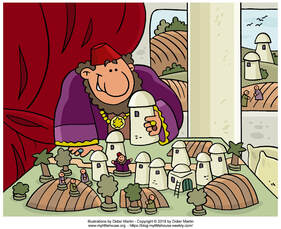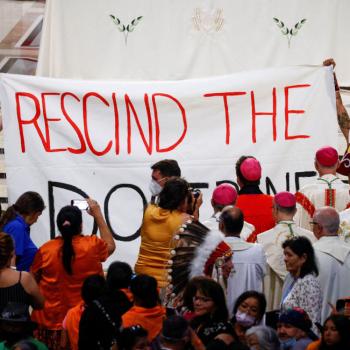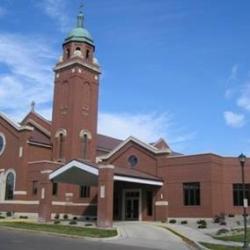
We remember Jesus’ words near the beginning of Chapter 12 in Luke’s Gospel: “Do not be afraid. You are worth more than many sparrows.” And again at the end: “Do not worry about your life and what you will eat, or about your body and what you will wear…. Notice how the flowers grow. They do not toil or spin….” But between these two irenic trains of thought, like between two slices of bread, Luke sandwiches a story that is more gritty and down-to-earth: the Parable of the Rich Fool. Because Luke “sandwiched” it in (it probably didn’t happen historically in this sequence), because it’s Jesus’ teaching style, and because it concerns (in a way we don’t expect) social justice, a favorite theme of Luke’s, I suspect the heart of Chapter 12 is here. The Parable of the Rich Fool tells us there is something that really is worth worrying about.
Eighth in a series on social justice in the Gospel of Luke. I will turn to Kenneth E. Bailey’s double volume Poet and Peasant and Through Peasant Eyes for help. He examines the Parable of the Rich fool in Through Peasant Eyes, pages 57-73)
The matter of an inheritance
Luke Chapter 12 begins with a crowd so large that they were “trampling one another underfoot.” (12:1) But Jesus speaks, first, only to his disciples. In the last part of the chapter, he’s also speaking to the disciples. He might have ignored the crowd altogether except for an impertinent “someone” in the crowd. Or Luke placed the man’s story here, making sure we understand how the audience changes. For the parable the audience, especially that one person, is important.
We know nothing at all about this interrupter except for what we can surmise from his demand. “Teacher,” he says, “tell my brother to share the inheritance with me.” (12:13) Apparently, there’s a substantial inheritance, probably of land, and a quarrel about who gets it.
It’s a rather common situation with inheritances. Fortunately, my brother and sisters and I were spared the interrupter’s problem. Unlike some families, when we came to the time of dividing up the money and goods our parents left, everything was peaceful and even fun. What choice did we have? Dad had written pointedly in his will how confident he was that his children would divide the inheritance fairly.
For the would-be heir in the crowd accompanying Jesus and the disciples, it isn’t like that.
Just distribution or healthy relationship
Bailey in Through Peasant Eyes points out what anyone can see: “There is obviously a broken relationship between this man and his brother.” (p.61) The man assumes Jesus can give a legal decision since he calls him Teacher, i.e., Rabbi. But such a decision, without consulting the brother, would only make the break permanent. Instead of that, Jesus tells a parable.
We remember the bare bones of the story: A rich man has a surprisingly good harvest. His barns aren’t big enough to store the grain, so he builds bigger barns. Then he thinks he can relax – “eat, drink, and be merry.” But he dies before he gets a chance to enjoy his wealth. The moral, we suppose: Wealth isn’t everything. God takes care of the sparrows and clothes the flowers of the field. But Jesus’ parable is a good deal more complex than the aphorisms with which Luke surrounded it. Bailey sees Jesus dealing not just with an inheritance or money but, more, with a relationship. And we see that, for Luke, justice is about more than distribution of goods.
The Parable of the Rich Fool (Luke 12:13-21)
Someone in the crowd said to him, “Teacher, tell my brother to share the inheritance with me.” He replied to him, “Friend, who appointed me as your judge and arbitrator?” Then he said to the crowd, “Take care to guard against all greed, for though one may be rich, one’s life does not consist of possessions.”Then he told them a parable.
There was a rich man whose land produced a bountiful harvest. He asked himself, ‘What shall I do, for I do not have space to store my harvest?’ And he said, ‘This is what I shall do: I shall tear down my barns and build larger ones. There I shall store all my grain and other goods, and I shall say to myself, “Now as for you, you have so many good things stored up for many years, rest, eat, drink, be merry!”’ But God said to him, ‘You fool, this night your life will be demanded of you; and the things you have prepared, to whom will they belong?’
With Bailey I’m looking at this story with these questions in mind:
- Did Jesus actually tell this story, and what difference does it make?
- What would a first-century Palestinian peasant hear in Jesus’ original story that we don’t hear?
- How would a Greek translator’s word choice later strike a reader of Luke’s Gospel?
Did Jesus tell the story?
Modern Bible scholars have developed, along with students of other ancient literature, various methods of interpretation. One result of their quest is that it’s hard to tell if sayings attributed to Jesus were actually his own words. They may have originated in the preaching and storytelling of communities in which oral traditions were passed on. Presumably, in Christian communities it was with the “Spirit” of Jesus guiding.
Another conclusion is that Jesus’ most typical way of teaching is through parable, or story. So, Bailey says, this story and accompanying dialogue “is in full harmony with everything we know about Jesus.” Adding credibility is that it also occurs in the Gospel of Thomas. Summing up the scholarly consensus on this story, Bailey notes, “Its authenticity has been affirmed by leading Jewish and Christian scholars.” (p. 61)
This authenticity, the tracing the story back to the historical Jesus, is important. It means that the original hearers of the story were not Luke’s more urban church groups but a crowd of mostly Palestinian peasants.
What the peasants would have heard
Bailey’s cultural studies help us understand what Jesus’ peasant audience would have heard. There’s a lot going on in the dialogue between the brother and Jesus and in the story Jesus tells that we’d otherwise miss.
The original hearers would notice the subtle putdown as Jesus addressed the man as “Friend.” They would be surprised that Jesus dares to thwart convention. Typically a person would give at least a sympathetic ear to a plea for justice. (p. 60-61)
As Jesus’ story unfolds, these peasants would notice also the odd behavior of the rich man. Faced with a problem, too large a harvest, he arrives at a solution by thinking by himself. The text says he “asked himself.” That may be a normal procedure in our day but not in an ancient Middle-Eastern culture. In that culture, Bailey notes, life is “gregarious.” You “sit at the gate” with townsfolk. There “the slightest transaction is worthy of hours of discussion.” You make up your mind “in community.” But this rich man
… dialogues with himself. He obviously has no one else with whom to talk. He trusts no one…. Thus we begin to get Jesus’ picture of the kind of prison wealth can build. (p. 64-65)
Subtly Jesus has built a picture of a person very much like the complainer who wants his inheritance. This man also decides all by himself concerning what he should get and what Jesus should do to help him.
“Judge” or “divider” – what Luke’s audience would hear
Bailey rejects my Bible’s translation of an unusual, for the New Testament, Greek word. The New American Bible has:
Friend, who set me to be a judge or arbitrator over you?
The Greek word translated “judge” appears only here in the whole New Testament. It typically means divider as of an inheritance. That’s how translations should render it, Bailey says. Then Bailey notes a subtle resemblance this Greek word has to another Greek word which means reconciler. Bailey thinks Luke’s audience would hear the unspoken “reconciler” along with the spoken “divider.” Jesus refuses to be a divider, but if not that, then what? Obviously (at least in Greek) reconciler. For Jesus and Luke a just distribution of goods is important, but a price of irreconcilable differences may be too great.
Possessions
The Parable of the Rich Fool isn’t indifferent toward having possessions. Even wealth is OK in itself. But the story does put some distance between people and their possessions. “One’s life does not consist in abundance of possessions,” Jesus says. (12:15) Jesus is critical only when one’s relationship to one’s possessions gets too close.
We can see that attitude in the rich fool. Repeatedly for him it’s “me” and “mine.” Nine times in his little speech to himself he refers to himself or his “soul.” As for his possessions, it’s “my crops,” “my barns,” “my grain,” “my goods,” even “my soul.” To Jesus’ listeners, most of whom would have had few possessions, that must have been a bit much.
Bailey sees Jesus’ demolition of this possessiveness in an odd phrase closing the parable.
You fool! This very night your life is being demanded of you. (12:20)
We’re used to odd expressions in sacred writings so their oddity doesn’t strike us. But think: normally a person would say, “This very night you’re going to die.” Jesus isn’t dolling up a story with some fancy verbiage. There’s a point to the language of demanding a life. It’s like a landlord, who demands what by law is his from the farmers who work his land.
The verb “is demanded” in Greek is a word that is commonly used for the return of a loan. [The rich man’s] soul was on loan and now the owner (God) wants the loan returned. (p. 67)
Who owns the harvest now?
The parable’s final thought could have been, “You can’t take it with you.” Instead of this narrow focus on the rich man, God says,
… and the things you have prepared, to whom will they belong? (12:20)
I never thought much about this question, but family farmers think about it a lot. People in general just naturally care who gets their inheritance. With this question God points out to the rich fool his deepest poverty. He will never have the satisfaction of passing on to the future the legacy of his life.
His whole life he has thought of his possessions as his own. At the beginning of the story it doesn’t occur to him to thank God for that unusually large harvest. It was a surprise, but it’s not in the rich man’s nature to appreciate surprises. It was out of proportion to the effort he put in, but it doesn’t occur to him to thank God.
About gifts and loans
We who are rich haven’t earned our possessions any more than the rich fool. We hold them as gifts if we are wise. That means holding them with a light touch, appreciating the giver as much as the gifts. It means showing our appreciation by our willingness to pass on what we have received.
The rich fool would have known the answer to his storage problem if he had looked around, if he had sat with enough different people at the city gate. He always had more than enough storage for his bountiful harvest – in the mouths of the hungry people around him. (p. 64. Bailey quotes that thought uttered by one of the early saints and doctors of the Church, St. Ambrose.)
The Parable of the Rich Fool speaks directly to this time of extreme inequality. The goods we possess are ours only as gifts or even as loans from the divine landlord. There are many ways to show appreciation for these gifts or pay back these loans. Building ever bigger “barns” isn’t one of them.
If the moral of the Parable of the Rich fool can be told in one breath, a saying that I learned first in Spanish says it pretty well:
El servicio es la renta que pagamos por nuestro lugar en la tierra.
Service is the rent we pay for our place on earth.











